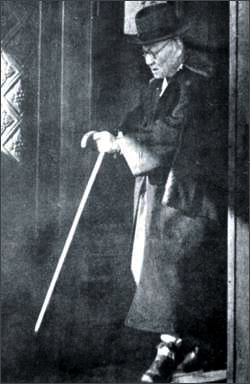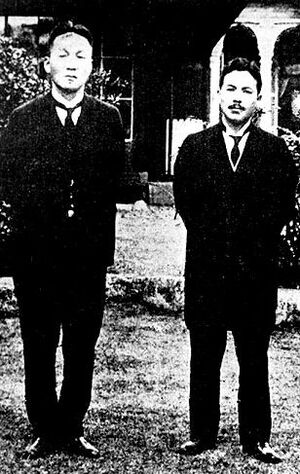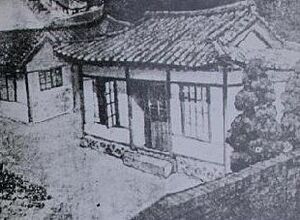Song Jin-woo (journalist) facts for kids
Quick facts for kids
Song Jin-woo
|
|
|---|---|
 |
|
| Personal details | |
| Born | 8 May 1889 Damyang, South Jeolla Province, Joseon |
| Died | 30 December 1945 (aged 56) Seoul, South Korea |
| Political party | Korea Democratic Party |
| Awards | Order of Merit for National Foundation, 3rd Grade |
| Korean name | |
| Hangul |
송진우
|
| Hanja | |
| Revised Romanization | Song Jinu |
| McCune–Reischauer | Song Chinu |
| Art name | |
| Hangul |
고하
|
| Hanja | |
| Revised Romanization | Goha |
| McCune–Reischauer | Koha |
| Childhood name | |
| Hangul |
옥윤
|
| Hanja |
玉潤
|
| Revised Romanization | Ongnyun |
| McCune–Reischauer | Ogyun |
Song Jin-woo (Korean: 송진우, 8 May 1889 – 30 December 1945) was an important Korean independence activist, a journalist, and a politician. His special pen name was Goha (고하; 古下). He led The Dong-a Ilbo newspaper several times and was a founder of the Korea Democratic Party.
In 1945, he was sadly killed by a member of a group called the White Shirts Society.
Contents
Early Life and Education
Song Jin-woo was born on May 8, 1889, in Damyang, which is in South Jeolla Province, Joseon (now South Korea). He was the fourth son in his family.
From a young age, he studied traditional Chinese texts. When he was 15, he got married. Later, he started learning more modern subjects at a school called Yeonghaksuk. There, he met Kim Seong-su, who would become a lifelong friend and colleague.
In 1907, Song decided to study in Japan to learn more about the world. He first went to a school in Gunsan, then moved to Tokyo with Kim Seong-su. They both managed to get into Waseda University in 1910. However, they returned to Korea when they heard that Japan had taken control of the peninsula.
The next year, Song went back to Japan to study law at Meiji University. While there, he helped start a group for Korean students and a student magazine. He finished his studies in 1915.
Working for Korea's Future
In 1916, Song Jin-woo became the vice principal of Choongang School in Seoul. He later became the principal. In 1918, he and others secretly began planning an uprising against the Japanese government.
After the March 1st Movement protests in 1919, Song was arrested. He was held in Seodaemun Prison for about a year and a half. He was later found innocent and released in October 1920.
Leading The Dong-a Ilbo Newspaper
In 1921, Song became the third leader of The Dong-a Ilbo newspaper. During his time, the newspaper strongly supported Korean nationalist movements. These movements encouraged Koreans to buy local products and to build their own universities.
The Japanese government often tried to stop The Dong-a Ilbo from publishing. In 1926, the newspaper was stopped for celebrating the March 1st Movement. Song was even sent to prison again for a short time. He became the newspaper's leader again in 1927.
In 1930, the newspaper was stopped a third time. But it started publishing again later that year. In 1931, the paper supported restoring the Hyeonchungsa Shrine and ran a campaign called the V Narod Movement. This movement helped teach people in rural areas to read, which helped spread ideas of resistance.
In 1936, The Dong-a Ilbo was stopped a fourth time. This happened because the newspaper removed the Japanese flag from a photo of a Korean athlete at the Berlin Olympics. The newspaper was forced to close completely in 1939. Song tried to protest its closure in Japan but was arrested.
After his release, Song stayed at home, pretending to be ill. He felt very sad that he could not speak out against the Japanese government. He wrote that The Dong-a Ilbo was like his "mouth, ears, nose, hands, and feet," and without it, he felt helpless.
After Korea's Freedom
After Korea became free from Japanese rule in 1945, the Japanese government planned to leave. They considered Song Jin-woo as someone who could help lead the new Korean institutions. They offered him a powerful position, but Song refused it. He believed taking the job would be like working for the Japanese, which he did not want to do.
Another leader, Lyuh Woon-hyung, then formed a group called the Committee for the Preparation of Korean Independence (CPKI). Lyuh asked Song to join many times, but Song said no. To offer a different path for Korea, Song became a founding leader of the National Foundation Preparation Committee on September 7. He also helped create the Korea Democratic Party on September 16.
In December 1945, a meeting was held in Moscow. The United States and the Soviet Union announced that Korea would be occupied for 5 years. This news caused a big movement against this plan, called the Anti-trusteeship Movement. Song and other leaders were very upset by this decision.
Death
Early in the morning of December 30, 1945, Song Jin-woo was killed by a group of seven men. One of them was Han Hyeon-wu, who was part of the White Shirts Society.
Legacy and Awards
On March 1, 1963, Song Jin-woo was given the Order of Merit for National Foundation, third grade, after his death. This award recognized his important work for Korea's independence.
See also
- Kim Seong-su
- Kim Ku
- Yun Posun
- Sin Ik-hui
- Chang Deok-soo



